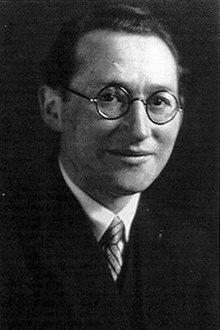
Back كورت ليفين Arabic كورت ليفين ARZ Kurt Lewin AST Kurt Levin Azerbaijani کورت لوین AZB Курт Левін Byelorussian Курт Левин Bulgarian Kurt Lewin BS Kurt Lewin Catalan کورت لەڤین CKB
Kurt Lewin | |
|---|---|
 | |
| Born | 9 September 1890 |
| Died | 12 February 1947 (aged 56) Newtonville, Massachusetts, U.S. |
| Nationality (legal) | German |
| Citizenship | German Empire, United States |
| Alma mater | University of Berlin |
| Known for | |
| Spouses | Maria Landsberg
(m. 1917; div. 1927)Gertrud Weiss (m. 1929) |
| Children | 4 |
| Scientific career | |
| Fields | Psychology |
| Institutions | Institute for Social Research Center for Group Dynamics (MIT) National Training Laboratories Cornell University Duke University |
| Thesis | Die psychische Tätigkeit bei der Hemmung von Willensvorgängen und das Grundgesetz der Assoziation (1916) |
| Doctoral advisor | Carl Stumpf Kurt Koffka Max Wertheimer |
| Doctoral students | |
| Other notable students | |
Kurt Lewin (/lɛˈviːn/ lə-VEEN; 9 September 1891 – 12 February 1947) was a German-American psychologist, known as one of the modern pioneers of social, organizational, and applied psychology in the United States.[1] During his professional career Lewin applied himself to three general topics: applied research, action research, and group communication.
Lewin is often recognized as the "founder of social psychology" and was one of the first to study group dynamics and organizational development. A Review of General Psychology survey, published in 2002, ranked Lewin as the 18th-most cited psychologist of the 20th century.[2]
- ^ In an empirical study by Haggbloom et al. using six criteria such as citations and recognition, Lewin was found to be the 18th-most eminent psychologist of the 20th century. Haggbloom, S.J. et al. (2002). The 100 Most Eminent Psychologists of the 20th Century. Review of General Psychology. Vol. 6, No. 2, 139–152. Haggbloom et al. combined three quantitative variables: citations in professional journals, citations in textbooks, and nominations in a survey given to members of the Association for Psychological Science, with three qualitative variables (converted to quantitative scores): National Academy of Sciences (NAS) membership, American Psychological Association (APA) President and/or recipient of the APA Distinguished Scientific Contributions Award, and surname used as an eponym. Then the list was rank ordered.
- ^ Haggbloom, Steven J.; Warnick, Renee; Warnick, Jason E.; Jones, Vinessa K.; Yarbrough, Gary L.; Russell, Tenea M.; Borecky, Chris M.; McGahhey, Reagan; Powell, John L. III; Beavers, Jamie; Monte, Emmanuelle (2002). "The 100 most eminent psychologists of the 20th century". Review of General Psychology. 6 (2): 139–52. CiteSeerX 10.1.1.586.1913. doi:10.1037/1089-2680.6.2.139. S2CID 145668721.
© MMXXIII Rich X Search. We shall prevail. All rights reserved. Rich X Search